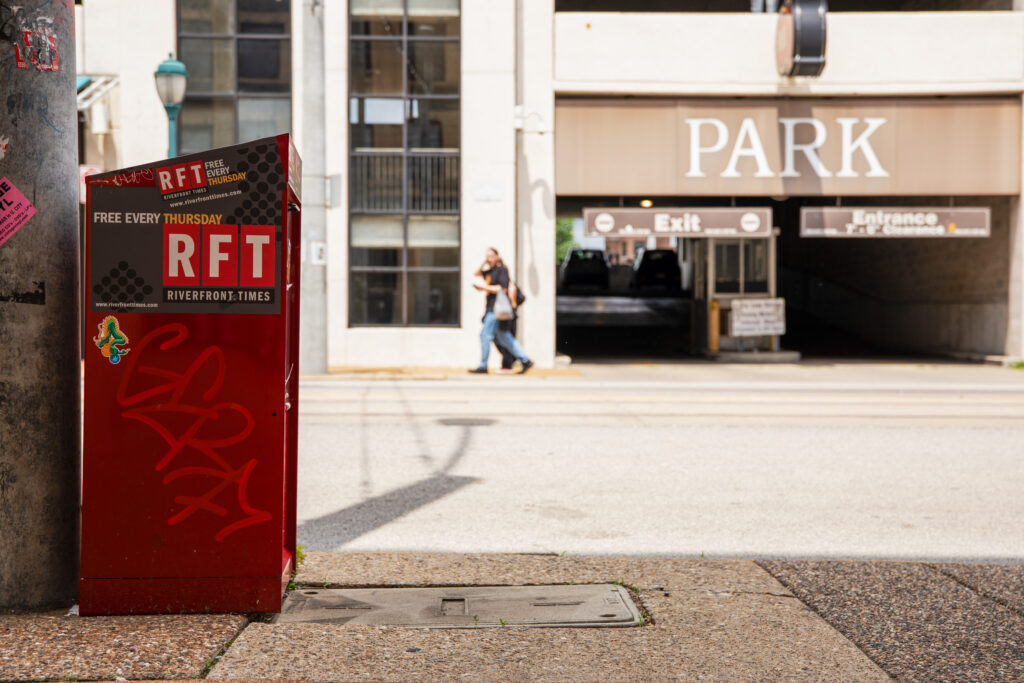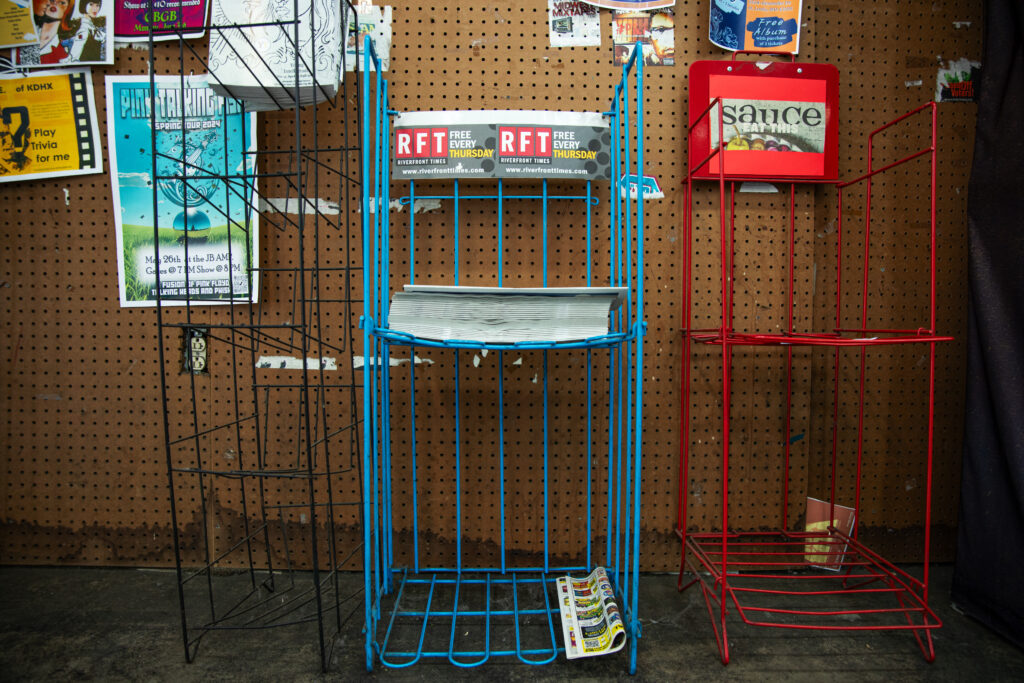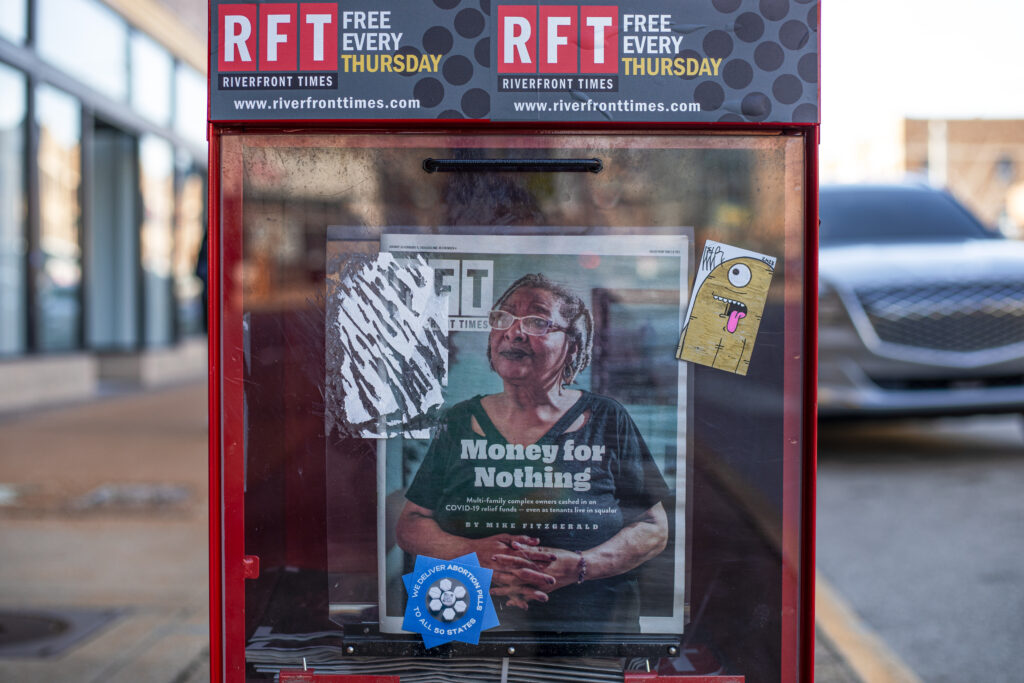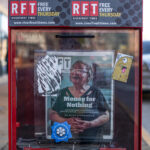The Riverfront Times 1977-2024
The heart of St. Louis, and its sole alt-weekly newspaper, The Riverfront Times, died on Wednesday, May 22.
My colleagues and I logged on to our weekly staff call at 9:30 a.m. and instantly I started to panic. Our executive editor, Sarah Fenske, was one minute late, and she was always, exactly, two to three minutes early.
All of us were already on edge.
Two weeks ago, the weekly meeting was pushed back an hour, and Fenske had logged on in tears with bad news: Two of our colleagues — the arts & culture staff writer and the paper’s audience engagement manager — had been laid off effective immediately that morning.
This time, all of us were shown the door. The paper’s owner, Chris Keating, asked Fenske to come in for a meeting at 8 a.m. on May 22. As she pointed out to us on the call, this is never good news in journalism.
At that 8 a.m. meeting he informed Fenske that he had sold RFT, and that none of the editorial staff would be kept. We were sacked immediately and told we’d receive our last paycheck in the coming days. This is the same situation that happened to the first professional newspaper I ever worked at, the Southern Illinoisan. Lee Enterprises sold the Southern in 2023 to Paxton Media Group who fired the entire staff.
Keating was not even present on the call. Instead, Fenske informed us an hour and a half later.
Some staffers broke down with her, and others were angry. None of us was truly shocked. Keating didn’t have the funds or business planning to offer severance or even a full paycheck to the staffers he sacked second hand.
A few weeks prior to the sale of RFT, Keating fired Laura Bassett who he had just hired on Feb.1 as the executive vice president of his company, Big Lou Holdings. Big Lou Holdings also owns and operates Out In STL, Sauce Magazine, the Detroit Metro Times, the Cincinnati CityBeat, and LEO Weekly, which is based in Louisville, Kentucky.
Bassett, the former EIC of Jezebel and an election columnist with the Cut, is based in New York and was an exciting addition to the company. She didn’t make it 90 days under Keating’s leadership. Keating purchased RFT in August 2023 as owner of Big Lou Holdings LLC, according to RFT. Prior to this, he had been the chief operating officer of Euclid Media Group, the paper’s previous owner.
At the time, Keating said as reported by RFT:
“The Riverfront Times has a long tradition of excellence, and I plan to continue that. Whether it’s great restaurant criticism or a deeply reported story that explains the most important issues facing our communities, people rely on these publications. I intend to make sure they not only survive but thrive in this new era.”



After leaving the company Bassett started her own Substack called “Nightcap.” In one of her first posts to the platform she explained her departure from Big Lou. In this post, which can be viewed here, Bassett spoke of potential layoffs and of a job offer to an editor that was allegedly rescinded.
“Twenty days into the job, I woke up to an email from Keating threatening to fire me if I was uncomfortable ‘making staffing changes,’ aka firing the entire staff of a beloved local newspaper. I managed to talk him off the ledge for a few more weeks,” she wrote. “But he laid me off anyway in mid-March, citing severe budget woes. He said he’d hoped to see a bigger jump in traffic across his portfolio sooner, that 90 days just wasn’t fast enough.”
So far Keating has declined to comment on the sale to news outlets. In an email to GJR Keating declined to say who the new buyer is but said: “I do not have a comment about the sale specifically as my priority is doing all I can to help as many former RFT employees land jobs elsewhere at Big Lou or other employment opportunities.”
On the call, Fenske told us what she could and was kind to all of us, even while breaking down herself from the news that she too is now unemployed. She called us afterwards offering to be a reference, and she has maintained our company Slack channel – which she and the managing editor administrate – sending opportunities and jobs to all of us.
We don’t know who the new buyer is, and we don’t know what they plan to do with the website. We lost our email access the next afternoon.
Before these layoffs, I debated reporting a story about the merits of alt-weekly publications and why I believe they have the power to revive journalism and local news. Despite everything, I still believe this is true.
RFT is the first (professional) publication that valued my voice as a reporter, and that valued my ideas.
Before working for the alt-weekly, I worked as a general assignment reporter for Lee Enterprises and as a public safety reporter for McClatchy. These publications canned important stories for the sake of pageviews, and at McClatchy, used the term “accountability” only as a quick buzz word when talking about pageview metrics and corporate goals.
At the RFT, accountability was prized above all else and was something all of us chased daily.
This idea of chasing accountability was also implemented behind the scenes at our own newspaper. Fenske made sure that no matter how small they were, any extra edits or corrections after publication would be noted to the reader with an editor’s note at the bottom of a story. This promoted a level of trust and transparency with our readers that many newspapers are lacking.
Fenske is one of the best editors I have ever had the pleasure of working with. She knew how to provide mentorship on a deadline, enhance a complicated policy story, write a killer headline, and most importantly to our coverage, how to listen.
She never pressured me to run a mugshot in my stories — something I am adamantly opposed to in most cases — and she allowed me to direct much of our coverage regarding protests against Israel’s brutal onslaught of Gaza and the Palestinian people. She never pressed me to use terms I felt didn’t do the situation justice like calling it the “Israel-Hamas war” as other St. Louis outlets do, following guidance from the Associated Press. She allowed me to use the term “genocide” with attribution in paraphrases and quotes — small things that allowed us to cover the situation in an empathetic and thoughtful way. This gained us more trust and sources in the community and led to better coverage.
We were one of the publications that, despite our lack of funding for any kind of legal support, stayed at Washington University as police began to violently arrest peaceful protestors, shoved a bike in the face of a presidential candidate, and injured an elderly professor standing off to the side filming the scene. The local TV stations left.
Alt-weekly publications are the future of news and hold the key to revitalizing trust in local media because they are run by locals, not soulless corporations and hedge funds too caught up in their own bureaucracy to recognize the needs of their community. And perhaps most importantly, they are free.
At 24, I no longer know a single person my age who has a subscription to a local newspaper. I knew a few fellow journalism students in college but with the return of student loan payments, jumps in inflation, and mass layoffs, one by one they canceled.
We were one of the only free newspapers in St. Louis that had coverage of the arts, local politics, and that put police accountability at the forefront of our paper. Now that is gone and the community is worse off for it.
The Riverfront Times told stories other outlets wouldn’t touch, scooped major accountability stories that left legacy media scrambling to follow, and featured communities, artists, and activists who otherwise would not have received media attention in the city.
Just recently, my colleague Ryan Krull covered the fact that a racist church leader is helping to vet GOP candidates in Vernon County, contributor Mike Fitzgerald reported how COVID-19 relief dollars fueled an illegal rooming house operation, and the paper recently ran my cover story that a McClatchy paper had previously turned down about how abortion doulas are filling care gaps in a post-Roe world.
The competition we helped foster pushed other outlets in the city to do better as well — and this competition is good for everyone. When reporters are scrambling to scoop each other and to get to the heart of a story in a way that is unique from their peers, the public benefits. Now with one less competitor, St. Louis will have a less informed populace and especially in an election year, that’s a damn shame.
Kallie Cox is a freelance journalist who previously worked for the Riverfront Times. They can be reached at Kecoxmedia@gmail.com

I certain to strive https://www.cornbreadhemp.com/collections/thc-drinks out of interference after hearing so numerous people talk about it. The acquaintance has been smooth and gentle to embody into my daily routine. The texture is illuminate, and the flavor is demulcent compared to other oils I’ve tried. I comprehend how uncluttered the dosing is and how convenient the packaging feels.
After comparing specific brands, this [url=https://www.cornbreadhemp.com/products/full-spectrum-cbd-gummies ]cornbread full spectrum cbd gummies[/url] stood out-dated because of its clean ingredient list. The structure is velvety, and the flavor isn’t overwhelming. The company’s consumer help was responsive and reassuring with product questions.
超人和露易斯第一季高清完整版,海外华人可免费观看最新热播剧集。
Defensive errors, mistakes leading to goals conceded tracked
Thanks for finally writing about > Essay:
St. Louis longstanding alt-weekly dies – Gateway Journalism Review < Loved it!
and ExxonMobil, had their assets seized by 영동출장콜걸Venezuela in 2007 and
Nice post. I used to be checking continuously this
blog and I am inspired! Extremely helpful information specifically the remaining section 🙂 I deal with such info much.
I used to be seeking this certain information for a very long time.
Thanks and best of luck.
Continue criando conteúdo tão valioso!
Superb, what a blog it is! This website presents valuable
information to us, keep it up.
Thinker Pedia Good post! We will be linking to this particularly great post on our site. Keep up the great writing
Wonderful web site Lots of useful info here Im sending it to a few friends ans additionally sharing in delicious And obviously thanks to your effort
Its like you read my mind You appear to know so much about this like you wrote the book in it or something I think that you can do with a few pics to drive the message home a little bit but other than that this is fantastic blog A great read Ill certainly be back
Your blog is a beacon of light in the often murky waters of online content. Your thoughtful analysis and insightful commentary never fail to leave a lasting impression. Keep up the amazing work!
I have been browsing online more than three hours today yet I never found any interesting article like yours It is pretty worth enough for me In my view if all website owners and bloggers made good content as you did the internet will be a lot more useful than ever before
I’ve been following your blog for some time now, and I’m consistently blown away by the quality of your content. Your ability to tackle complex topics with ease is truly admirable.
빠르고 안전한 먹튀검증으로 먹튀 피해를 예방하세요. 먹튀검증 전문 커뮤니티 먹튀감정사에서 먹튀 없는 안전놀이터 정보를 제공합니다.
Your blog is a true gem in the world of online content. I’m continually impressed by the depth of your research and the clarity of your writing. Thank you for sharing your wisdom with us.
So talented! Custom Song That Tells Your Story
Your article demonstrates considerable promise, showcasing insightful ideas and a solid foundation. To elevate it to a truly outstanding level, consider the following enhancements: 1. Deepen your analysis by exploring key concepts more thoroughly, providing nuanced explanations, and addressing potential counterarguments. 2. Strengthen your arguments with additional evidence, including peer-reviewed sources, relevant statistics, and illustrative case studies. 3. Refine your writing style to engage advanced readers. Vary sentence structures, employ more sophisticated vocabulary, and ensure each paragraph flows seamlessly into the next. 4. Enhance the overall narrative arc. Craft a more compelling introduction that clearly outlines your thesis and a conclusion that reinforces your key points while highlighting broader implications. 5. Incorporate a more critical examination of alternative viewpoints to demonstrate a comprehensive understanding of the topic and pre-emptively address potential critiques. 6. Elaborate on the practical implications and real-world applications of your arguments. This will increase the relevance and impact of your work. 7. Draw connections to related fields or concepts, broadening the scope and appeal of your article while showcasing its interdisciplinary significance. 8. Consider incorporating more vivid examples or analogies to illustrate complex ideas, making your work more accessible without sacrificing depth. 9. If appropriate, include visual elements such as graphs, charts, or infographics to support your textual arguments and appeal to visual learners. 10. Ensure your conclusion not only summarizes your main points but also opens up avenues for further research or discussion, encouraging ongoing engagement with your ideas. Your innovative approach and clear writing provide an excellent foundation. By implementing these suggestions, you can transform your already solid work into an exceptional piece that resonates deeply with a professional audience and makes a significant contribution to your field. The potential for greatness in your work is evident. Your commitment to excellence shines through, and I’m confident that your continued efforts and refinements will yield truly impressive results. I eagerly anticipate seeing how you build upon these strengths in your future endeavors, further establishing yourself as a thought leader in your area of expertise.
✔️꽁타✔️꽁머니,토토꽁머니,꽁포,꽁머니이벤트✔️구글검색 꽁타✔️ 꽁머니 I loved as much as youll receive carried out right here The sketch is tasteful your authored material stylish nonetheless you command get bought an nervousness over that you wish be delivering the following unwell unquestionably come more formerly again since exactly the same nearly a lot often inside case you shield this hike
Your article is off to a fantastic start with some excellent ideas and solid points. To unlock its full potential, consider diving deeper into the topic. Your creative approach and clear writing are commendable, but adding more energy could make it even more engaging.While your examples are good, infusing them with more excitement could truly elevate your piece. Overall, the article is well-crafted but has room for enhancement. Strengthening your arguments and incorporating more compelling facts will make it even stronger. You have great potential, so keep challenging yourself. Your next piece has the potential to be truly outstanding. I’m eager to read your future work and see how you continue to improve. Keep up the excellent work!
Fantastic site. Lots of helpful information here. I am sending it to some friends free brazzers videos https://brazzers.pw/
슬로바키아는 선제골을 터트리고도 라인을 낮추지 않고 높은 위치에서부터 토지노 잉글랜드를 강하게 압박했다
이탈 토지노 분양 리아는 후반 19분 마테오 레테기를 투입하는 등 공격에 힘을 계속 줬다
[먹튀검증]으로 먹튀 피해를 예방하세요 먹튀오프가 안전한 온라인 카지노와 토토사이트를 선택할 수 있도록 도와드립니다.
[플레이포커 머니상]으로 안전하고 신뢰할 수 있는 온라인 베팅 환경을 경험하세요.
What a remarkable article! The way you’ve tackled the topic with such precision and depth is commendable. Readers are sure to gain a great deal from the wealth of knowledge and practical insights you’ve shared. Your profound understanding of the subject shines through every part of the piece. I’m eager to see more of your exceptional work. Thank you for offering your expertise and providing us with such enlightening and comprehensive content.
obviously like your website but you need to test the spelling on quite a few of your posts Several of them are rife with spelling problems and I to find it very troublesome to inform the reality on the other hand Ill certainly come back again
I was suggested this web site by my cousin Im not sure whether this post is written by him as no one else know such detailed about my trouble You are incredible Thanks
Your blog is a true hidden gem on the internet. Your thoughtful analysis and in-depth commentary set you apart from the crowd. Keep up the excellent work!
먹튀 피해 예방 [토토사이트] 먹튀검증으로 안전하고 신뢰할 수 있는 온라인 베팅 환경을 경험하세요.
먹튀 사이트로 인한 피해를 100% 예방하고 싶으신가요? [먹튀검증]으로 안전하고 신뢰할 수 있는 온라인 베팅 환경을 경험하세요.
What i do not understood is in truth how you are not actually a lot more smartly-liked than you may be now. You are very intelligent. You realize therefore significantly in the case of this topic, produced me individually imagine it from numerous numerous angles. Its like men and women don’t seem to be fascinated until it is one thing to do with Woman gaga! Your own stuffs nice. All the time care for it up!
My brother suggested I might like this blog. He was totally right. This post actually made my day. You can not imagine simply how much time I had spent for this info! Thanks!
Thank you for the auspicious writeup. It in fact was a amusement account it. Look advanced to more added agreeable from you! By the way, how could we communicate?
먹튀검증소: https://nktoday.kr/
Hi, i think that i saw you visited my web site thus i came to ?eturn the favor·I am attempting to find things to improve my web site!I suppose its ok to use some of your ideas!!
[먹튀검증] 토토사이트 먹튀 피해 예방을 위해 먹튀 사이트 검증 방법 총정리! 안전한 베팅을 위한 필수 지침
Thank you for sharing such an insightful and well-written article. I appreciate the thorough research and clear presentation of the topic. Your ability to break down complex concepts into easily understandable information is impressive and beneficial for readers. I look forward to reading more of your content and learning from your expertise. Keep up the great work!
This piece was incredibly enlightening! The level of detail and clarity in the information provided was truly captivating. The extensive research and deep expertise evident in this article are truly impressive, greatly enhancing its overall quality. The insights offered at both the beginning and end were particularly striking, sparking numerous new ideas and questions for further exploration.The way complex topics were broken down into easily understandable segments was highly engaging. The logical flow of information kept me thoroughly engaged from start to finish, making it easy to immerse myself in the subject matter. Should there be any additional resources or further reading on this topic, I would love to explore them. The knowledge shared here has significantly broadened my understanding and ignited my curiosity for more. I felt compelled to express my appreciation immediately after reading due to the exceptional quality of this article. Your dedication to crafting such outstanding content is highly appreciated, and I eagerly await future updates. Please continue with your excellent work—I will definitely be returning for more insights. Thank you for your unwavering commitment to sharing your expertise and for greatly enriching our understanding of this subject.
Normally I do not read article on blogs however I would like to say that this writeup very forced me to try and do so Your writing style has been amazed me Thanks quite great post
Keepyourjoyspreading
Keepyourheadup